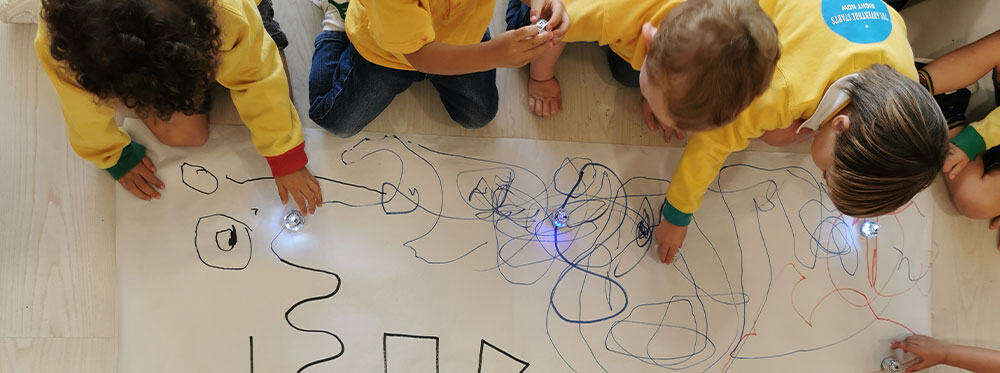As technology’s influence grows in our everyday lives, the potential and the demand to integrate technology into learning grows. This leads us to question precisely why, how and when we should be using technology. At St. Peter’s School Barcelona , in a PYP teaching environment, the focus is generally on learning through technology. Technology is the tool to learn and not the outcome itself.
This leads us to question precisely why, how and when we should be using technology. This is necessary as unrestrained tech enthusiasm leads to putting online as much of the curriculum as possible, leading to an educational and social dystopia which all parents with screen-hungry children are likely to have glimpsed!
As the field is evolving so fast, the educational world is constantly reviewing and updating its responses to these questions. The Primary Years Programme (PYP) is at the forefront of defining new frameworks that underpin the development of critical thinking, self-reflection and lifelong learning. The most recent review came with the PYP Enhancements (IBO, 2018) which replaced the previous ICT technology outcomes, and made a clear distinction between learning technology, learning through technology and learning about technology. In a PYP teaching environment, the focus is generally on learning through technology. Technology is the tool to learn and not the outcome itself.
Parallel to these developments there has been a significant development of Maker Education over the last decade. Maker Education focuses on problem-based and project-based learning built around hands-on, often collaborative, learning experiences as a method for solving authentic problems. There is a growing community of makers who follow the principles of Makers Education which gained traction through Project Zero operating out of the Harvard School of Education. Makers Education believes that technology can be analogue (such as, scissors and sticky tape) or digital (computers, microcontrollers, for example) and that by using these technologies students can `develop their sensitivity to design´ (Clapp et al. 2018). They can develop a sense that the world around them – physical, systemic and digital – is malleable and that they can have an influence on their environment by taking action. Makers Ed also gives students a voice in their learning. Two principles underpinning Makers Education are “agency” and “self efficacy”. Agency means learning through activities that are meaningful and relevant to learners, driven by their interests, and sometimes self-initiated with guidance from teachers. Student agency gives students voice and often, choice, in how they learn. Self efficacy means that students are aware of their own ability to successfully complete a design project that is effective in solving the identified problem. Once student agency and self efficacy combine, the results can be stunning.
At St Peters we combine the PYP and principles of Makers Ed when learning through technology in primary school, which focuses on developing students’ self efficacy through agentic learning opportunities. We want students to be able to view the world through a critical lens and understand why they are learning (Murdoch, 2019). This is more important than using the latest gadget. Using technology, analogue or digital, to create things that will make a difference to students’ world is the ultimate goal. We allow students the freedom within a design brief to create meaningful solutions to real world problems they can identify and understand. Creativity flourishes within constraints (Needles, 2020). My job as a technology integration specialist is to provide the students with skills, knowledge and opportunity to integrate technology in this way.
Further reading:
- International Baccalaureate Organisation (IBO) (2018). Preparing the for the Enhanced PYP. Available at: https://blogs.ibo.org/sharingpyp/files/2017/09/FINAL-TEXT-Preparing-for-the-enhanced-PYP.pdf
- Clapp, E. P., Ross, J., Oxman Ryan, J.,, & Tishman, S. (2016). Maker-Centered Learning: Empowering Young People to Shape their Worlds. Hoboken, NJ : John Wiley & Sons.
- Murdoch, K. (2019) ‘Keeping it Real: Inquiry and Authenticity,’ Kathmurdouch.com Available at: https://www.kathmurdoch.com.au/blog/2019/6/2/keeping-it-real-inquiry-and-authenticity
- Needles, T. (2020) ‘Everyday Creativity,’ TEDxTalk Available at: youtu.be/n3Kw5dumDg4
- What is Project Zero? – 5 minute animated video. Available at: http://www.pz.harvard.edu/who-we-are/about
By James Haworth, Technology teacher in PYP

